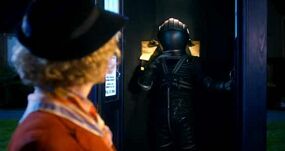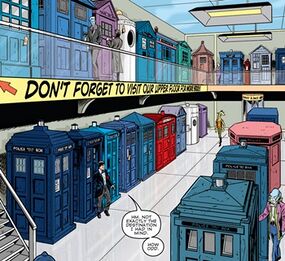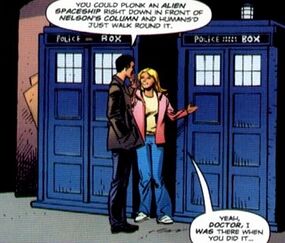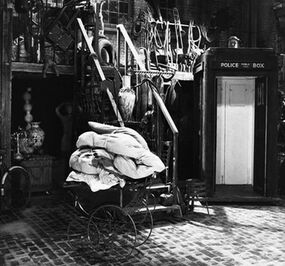Police box
A police box — or police public call box — was a telephone kiosk that could be used by the police to call into a station (TV: Logopolis) or by members of the public wishing to get help from the police. (TV: "Bell of Doom") They were typically placed on streetcorners. (TV: Boom Town)
Unlike telephone booths, a police box phone was on the outside of the structure, in a little compartment that had an exterior instruction plate. (TV: The Empty Child) According to Tegan Jovanka, who once read aloud the instructions on a TARDIS disguised as a police box in the Borough of Barnet, the instructions were:
- Police Telephone
- Free for Use of Public
- Advice and Assistance Obtainable Immediately
- Officers and Cars Respond to Urgent Calls
- Pull to Open (TV: Logopolis)
Function and physical characteristics
Police boxes were about the size of a large cupboard, and could provide shelter to those police officers who had the key. (TV: The Doctor, the Widow and the Wardrobe) Inside were kept a writing desk and stool, and often an electric heater, (AUDIO: The Eternal Summer) as well as materials relevant to the conduct of police business — such as clipboards, writing utensils and forms. (TV: The Doctor, the Widow and the Wardrobe) By 1981, the Barnet Bypass police box was being used to store orange road warning lights. (TV: Logopolis)
As the Ninth Doctor once pointed out, there was enough space in a typical police box to temporarily house a prisoner. He indicated that a typical usage was for a policeman to pop an arrested individual into the police box and lock the doors until transport to a police station could be arranged. (TV: Boom Town)
Recognition
Due to the Doctor's TARDIS, the police box shape was recognised in the wider universe beyond Earth.
Krasko, a criminal from the 79th century, recognised what appeared to be a police box in 1955 Montgomery as potentially a TARDIS, going on to suggest that it would be worth a lot of money. (TV: Rosa)
On Exxilon, the Daleks tested their substitute weaponry on target models fashioned as miniature police boxes. (TV: Death to the Daleks)
Within the Frenko Bazaar, police boxes were sold for both functional and decorative needs at Just Police Boxes, which was once accidentally visited by the Second Doctor. (COMIC: Bazaar Adventures)
Real life incidents and appearances
Origin
In the time before telephones and modern policing, a culture of art and prophecy developed around "the blue box", appearing in religious stained glass windows, (TV: The End of Time) paintings, (TV: The Pandorica Opens) and ancient prophecy. (TV: The Fires of Pompeii) This lead to the inspiration of the design of the police box as a place one could find help. (COMIC: Prisoners of Time[which?], Hunters of the Burning Stone)
Service
On 11 June 1925, a police officer at first mistook the Fifth Doctor's TARDIS for a real police box until invited inside by him. (TV: Black Orchid)
Professor Edward Travers knew that the Doctor's TARDIS he saw in 1935 resembled the police box model by Gilbert MacKenzie Trench. (PROSE: Times Squared)

The Eleventh Doctor mistook a real police box for the TARDIS on Christmas Eve 1938. (TV: The Doctor, the Widow and the Wardrobe)
In Foxgrove on 18 August 1951, Sarah Jane and Luke stumbled upon a police box. They thought that the Doctor had arrived to help them, but realised it was an ordinary police box when PC Ferguson popped his head out. (TV: The Temptation of Sarah Jane Smith)
In Wales in 1959, American secret agents Jerome Weismuller and Hawk used a police box to contact their superiors at the Pentagon. (TV: Delta and the Bannermen)
An actual police box sat across the street from where the Seventh Doctor had landed the TARDIS in 1963. (TV: Remembrance of the Daleks)
Returned to London in 1965, Ian Chesterton and Barbara Wright amused themselves after sighting a real police box. (TV: The Chase)
During a trip to London in 1966, the Ninth Doctor appreciated the fact that it was one of the rare occasions the TARDIS's police box exterior was "any cop as a disguise". Rose Tyler noticed the TARDIS had landed next to a genuine police box and asked if they normally came in pairs. (COMIC: The Love Invasion)
The Doctor's TARDIS materialised around the Barnet Bypass police box, whereupon Tegan Jovanka entered the Doctor's TARDIS shortly thereafter, mistaking it for the genuine police box. Later, the TARDIS dematerialised, leaving the nearby policemen with nothing more than an ordinary police box. (TV: Logopolis)
The Barnet Bypass police box was mistaken for the Doctor's TARDIS by Prince Genei, who immediately abandoned his plans to conquer Earth. Shortly afterwards, the police box — the last of its kind in England — was taken away, as it was considered useless. (PROSE: Useless Things)
Decommissioning
The Fourth Doctor was aware that police boxes were being phased out in the late 20th century, leading him to tell one of his temporary companions to stay on the lookout for police boxes if they ever wanted to travel with the Doctor again, as any blue box they spotted would likely be the TARDIS. (PROSE: The Doctor Who Dinosaur Book)
In 2006, Bridget Sinclair showed LINDA slides of the Doctor's TARDIS, which she described as looking like "a faux police box". In fact, she only had photos of various real police boxes. (TV: Love & Monsters)
Attempting to feign ignorance as regards the TARDIS, DI Patricia Menzies told the Sixth Doctor in 2010 that she thought that they only had police boxes in Scotland. (AUDIO: The Crimes of Thomas Brewster) According to Sam Bishop, police boxes in Scotland were mostly converted into coffee shops. This led Sam to believe the Ninth Doctor would serve him coffee and pastries out of his TARDIS. (AUDIO: Way of the Burryman)
Polly Wright told Thomas Brewster that she hoped that the Doctor had returned for her every time that she saw a police box. (AUDIO: The Three Companions)
When Alexei found the TARDIS on London's South Bank, Mahler mentioned an embarrassment on Earl's Court, implying that they'd earlier attempted to raid the actual police box stationed there. (TV: The Bells of Saint John)
On her first sight of the TARDIS, Yasmin Khan compared the ship to a green police box on Surrey Street, Sheffield. (TV: The Ghost Monument)
In the 2150 Dalek invasion of Earth of version of history "B", (PROSE: Dalek Survival Guide) the Black Dalek, the Red Dalek and two Robomen once patrolled a street of the ruined London, narrowly missing the presence of an older Susan in TARDIS, which they mistook for a simple police box. (HOMEVID: Untitled 1)
Disguises
The Doctor's TARDIS
On multiple occasions, ships, mainly TARDISes, had taken the shape of actual police boxes.
DI Billy Shipton was familiar enough with real police boxes to recognise the TARDIS as a counterfeit in the 2000s.[1] (TV: Blink)
Upon de-cloaking the TARDIS in the Oval Office in 1969, the Eleventh Doctor claimed that he and his companions were from Scotland Yard. (TV: The Impossible Astronaut)
Early in the First Doctor's travels, the TARDIS assumed the exterior shape of a police box during a stopover in 1963 London. Due to a malfunction in its chameleon circuit, the TARDIS became locked into that shape. (TV: An Unearthly Child, Boom Town, Utopia) The Eleventh Doctor had in fact purposefully destroyed the chameleon circuit, to inspire the look of the police boxes by spreading it through human history and culture. (COMIC: Hunters of the Burning Stone) The Eighth Doctor once claimed though that he removed his TARDIS' chameleon circuit, leaving it stuck in the likeness of a police box, to hide the Hand of Omega, though as he was tricking the Daleks, the validity of the statement is unknown. (AUDIO: The Shoreditch Intervention)
Dodo Chaplet entered the TARDIS on Wimbledon Common, believing it to be a police box and wanting to make an emergency call about a road accident in which a small boy had been knocked down. (TV: The Massacre)
On a visit to London in July 1966, the Doctor solved the potential problem of local policemen mistaking the TARDIS for a genuine police box and trying to use it by hanging an OUT OF ORDER sign on its doors. However, Dodo pointed out to him that not even the police would be able to open the door and, if they did, Scotland Yard could be "whipped off into time and space". (TV: The War Machines)
Bill theorised that the Doctor deliberately kept the TARDIS' disguise as a police box due to the implications behind the "Advice and Assistance Obtainable Immediately" line on its door. (TV: Smile)
Other ships
On 28 February 1981, as part of a complex plot, the Tremas Master materialised his TARDIS around a real police box on the Barnet Bypass. The Doctor's TARDIS, still disguised as a police box, materialised around the Master's TARDIS, also disguised as a police box, creating a dimensional anomaly and a trap for the Doctor. (TV: Logopolis)
The Doctor manipulated the chameleon circuit of the Monk's TARDIS to make it assume several shapes, including that of a police box. (TV: The Daleks' Master Plan)
When the Doctor once more met the Monk, he had voluntarily configured his TARDIS into the shape of a police box. (COMIC: 4-Dimensional Vistas)
To defeat a group of Death Squad Daleks, the Thirteenth Doctor reconfigured her spare TARDIS into a police box, using a hologram of herself to make the Daleks think it was her ship. (TV: Revolution of the Daleks)
During the events of the Master's Dalek Plan, as a mocking gesture the Spy Master configured his TARDIS with a police box exterior identical to the Doctor's but with all the signage changed to laughter. (TV: The Power of the Doctor)
Behind the scenes
- The British Broadcasting Corporation holds a trademark to the British design of the police box as used on Doctor Who.
- Although the TARDIS is depicted and referred to as resembling a wooden box on a number of occasions in the series, the exact design of police box the TARDIS is based on was built of concrete. Earlier models were indeed made of wood.
- The production team planned to feature the Barnet Bypass police box in the series in Logopolis, only to discover that it had been vandalised shortly before the filming dates. The series' spare police box prop was refurbished and pressed into service to stand in for the actual box.
- The first of six five-minute featurettes broadcast as part of the repeat showing of Planet of the Daleks in November/December 1993 was Bigger Inside Than Out, which was a history of the police box, narrated by Colin Baker. Because this featurette made extensive use of newsreel footage that would be very expensive, if not impossible, to clear for commercial release, it is unlikely to appear as a DVD or Blu-ray extra in the foreseeable future.
- As a gag, the invalid narrative webcast What's inside the Doctor Who LEGO set? featured the nonhuman character of Lady Estelle mistakenly assuming that police boxes were weapons, designed to be dropped on criminals from a great height.
Footnotes
- ↑ While Blink itself uncontroversially sets its main setting in 2007 and "twenty minutes to Red Hatching" a year later in 2008—as Kathy Nightingale's letter describes taking "one breath in 2007 and the next in 1920", and the Tenth Doctor's side of his conversation with Sally Sparrow in 1969 happens 38 years before Sally says hers—these are contradicted by heavily conflicting dates in the Redacted audio series later on regarding both Kathy's disappearance and the Red Hatching. In Angels, Abby McPhail identifies 2008 as the year of Kathy's disappearance, which suggests 2009 as the year of the Red Hatching. In Salvation, the Thirteenth Doctor recognises the Red Hatching as the cause of death of Andy Proctor, who was last seen by his daughter Cleo "nearly 20 years" before 2022 according to Recruits.
External links
- Metropolitan Police - History of the police box
- The Police Box page - from Ian McPherson's Kiosk Korner
- The Police Signal Box: A 100 Year History - 1994 paper by Robert W. Stewart (PDF format)
- The Great Edinburgh TARDIS Quest - Flickr set devoted to tracking down remaining Edinburgh police boxes.
- PoliceBoxes.com- Catalogue of model police boxes
- Police Box of Delights - A Brief TARDIS History - Detailing the various designs of Police boxes used throughout Doctor Who



